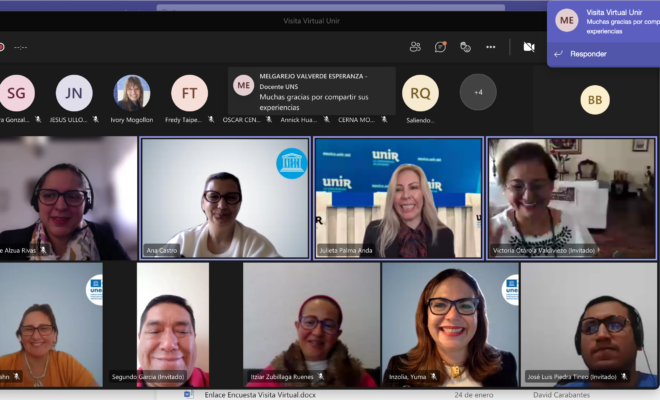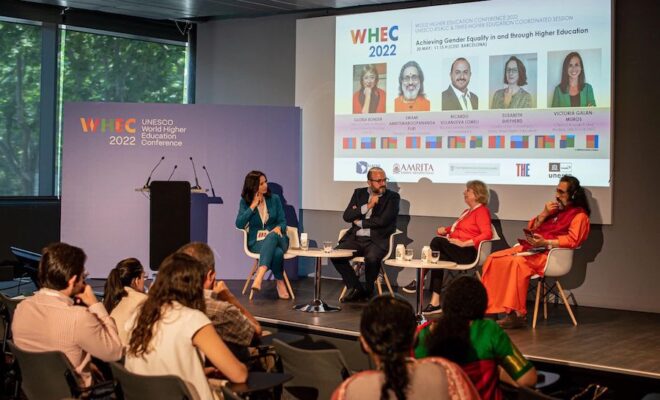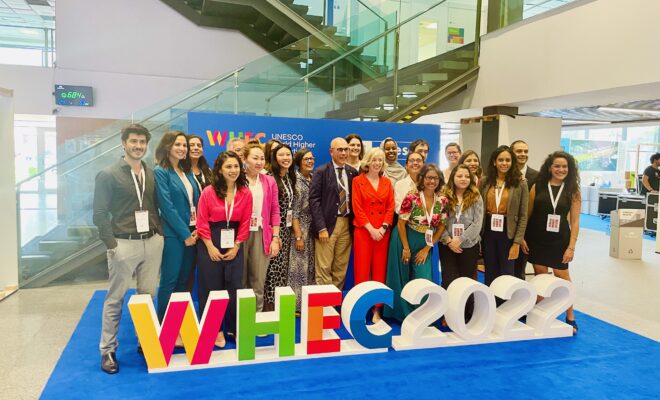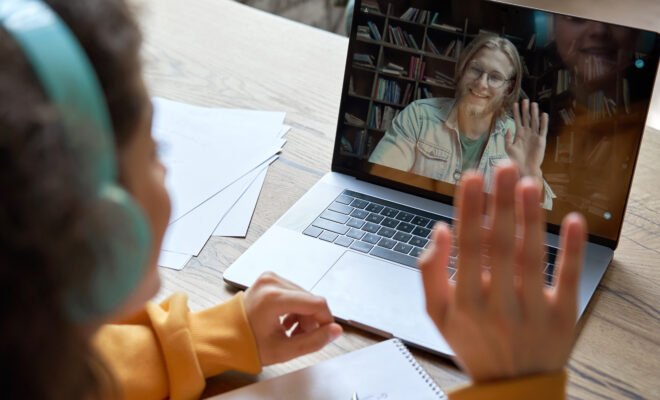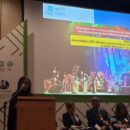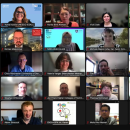Towards #WHEC2022. Webinar 9: Higher education and the ODS
One of the main axes of UNESCO World Higher Education Conference #WHEC2022, to be held in Barcelona (Spain) next May, is the Sustainable Development Goals (SDGs). In order to transfer the approaches of Latin America and the Caribbean, IESALC is carrying out a specific Regional Consultation, through a variety of events in order to bring together as many voices from different sectors as possible.
On this occasion, experts in the area participated in this online seminar – organized jointly with the IDB, the OEI, Santander Universities and the Ibero-American General Secretariat – and analyzed how the 2030 Agenda needs education to equip all people with the necessary knowledge, skills and values that will enable them to live with dignity and contribute to societies.
SDG 4 states: “Ensure inclusive and equitable quality education and promote lifelong learning opportunities for all”.
Target 4.3 “By 2030, ensure equal access for all women and men to affordable and quality technical, vocational and tertiary education, including university”. While target 4.7 is “By 2030, ensure that all learners acquire the knowledge and skills needed to promote sustainable development, including, among others, through education for sustainable development and sustainable lifestyles, human rights, gender equality, promotion of a culture of peace and non-violence, global citizenship and appreciation of cultural diversity and of culture’s contribution to sustainable development”.
Moderator: Victoria Galán-Muros, Head of Research and Analysis – UNESCO IESALC
Some ideas from the participants

Francesc Pedró, Director UNESCO IESALC
For UNESCO and for IESALC, which work in the context of the United Nations, there is probably no issue more important today than our contribution to the SDGs and the 2030 Agenda.
HEIs are committed to the contribution that can be made from the campuses themselves, from the issue of infrastructure, from the attitudes that are assumed and how coexistence is. In the teaching and learning function, there is not a single program where we cannot incorporate elements linked to sustainability.
The HEIs in our region, in many cases, have committed themselves, with fewer resources than desirable, to basic and applied research, aimed at guaranteeing -for example, with Covid-19 and the health of the most vulnerable populations- the needs regarding the SDGs.
HEIs must not only be exemplary in their determined commitment to everyday life, but also have the obligation to be at the forefront and to help the communities they serve to be inspired by that source of knowledge, commitment and critical vision of our societies and economies.
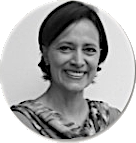
Mirian Vilela, executive director of Earth Charter International and coordinator of the UNESCO Chair for Sustainable Development, Brazil/ Costa Rica
Education for sustainable development requires rethinking the entire teaching-learning process so that HEIs can provide the space for personal and social transformation.
The role of HEIs is key: they must act as an engine in the processes of social transformation; they are a strategic element for the realization of sustainable development and the implementation of the SDGs; and they are a central axis for fostering citizenship with ethical responsibility for the common good, at the local and planetary levels.
We have HEIs with strong leadership and committed to sustainability, however many times they do not find support in the academic environment or vice versa. On the other hand, we have other HEIs that incorporate the SDGs only from one angle, for example, from the curriculum, academic management or in their role of responsibility to the community.
Some incorporate the SDGs at the level of image, because they see them as a communication opportunity, but are not coherent in assuming sustainability in an integral manner; and there are, increasingly fewer, those that have not incorporated them in any way.
Few are committed to the vision of sustainability from various angles, in a transversal way
Target 4.7 of the SDGs emphasizes the importance of education for sustainable development and for planetary citizenship in order to carry out the entire 2030 agenda. Education should be seen as an essential driver for implementing all SDGs, including gender equality and human rights at all levels: education policies, curricula, teacher training and student assessment.
According to UNESCO, education for sustainable development involves much more than just teaching knowledge and principles related to sustainability. It consists of educating for general social transformation with the objective of creating more sustainable societies.
It is a process that seeks to be: contextual and flexible, reflect the values of sustainability, based on critical and systemic thinking, inter- and multidisciplinary, and participatory and collaborative.
One of the great changes in recent years has been the growing participation of students in influencing these changes. Also important, in addition to the internal actors of each institution, is the commitment of international organizations – such as UNESCO – national governments, local communities, associations, networks and the rest of society in general.
As for the future, the teaching-learning perspective should be more inter- and trans-disciplinary, more flexible and collaborative, with an integral institutional approach and where universities assume their leading role in cultivating this sense of planetary responsibility, with public policies that emphasize the importance of education for sustainable development.

Miriam Alpizar Santana, Vice Minister of the Ministry of Higher Education of Cuba.
Governments have a fundamental role to reorient higher education and to have universities work directly on the SDGs through training, research, extension and from their own management
There must exist public policies that support the referential framework for HEIs to commit and direct their teaching-learning processes, as well as a national plan aimed at transparent indicators that can be measured and evaluated.
It is important for governments to respect and recognize the mission of the university in relation to the generation of knowledge for sustainable development and for the transformation required by our communities.

Orlando Sáenz Zapata, coordinator of the Observatory for Sustainability in Higher Education in Latin America and the Caribbean, Colombia
The approach we propose in Colombia is the need to build an institutional system of sustainability, which coincides with the integral institutional concept proposed by UNESCO. We have identified at least 5 areas of university action: education, research, extension, governance, and institutional environmental and social management.
In each of them there are a series of concrete practices based on the experiences in our universities and on the documents produced. These practices can be found, for open consultation, in the platform of the Observatorio de la Sustentabilidad en la Educación Superior de América Latina y el Caribe (Observatory for Sustainability in Higher Education in Latin America and the Caribbean)..

Olda María Cano de Araúz, academic vice-rector of the University of Chiriquí, Panama and member of the Governing Board of UNESCO IESALC
The priorities of HEIs to address the SDGs should be in three areas: training, research and extension. The academy has a fundamental role in the formation of global citizenship, leading to a human, participatory, socially and ethically responsible education. These students will be the agents of the necessary changes in society, and must receive competent training in order to implement them.
Through inter- and trans-disciplinary research, we must support and enhance the spectrum of approaches, in order to meet the challenges posed by the SDGs, which require greater human resources under the criteria of productivity, continuity and articulation.
In the area of outreach, partnerships and sustainable strategic alliances must be established in the short and medium term, to bring all stakeholders together for the development of leaderships to guide these SDGs.

Max Trejo Cervantes, Executive Secretary of the International Youth Organization for Ibero-America, Mexico
With the pandemic, the digital divide for access to online training has deepened, digitization and education have not been made compatible, and the curriculum does not contribute to facilitate access to the world of work for young people.
Higher education must be a driving force in the processes of social transformation for sustainability, and must have committed leaderships. We have to make this reinvention, not only to mitigate the effects of the pandemic, but to promote in-depth changes to position young people at the center of that education and enable them to be the protagonists of change, especially by strengthening their digital training.
Presentation
La educación superior y los ODS. Hacia la Conferencia Mundial de Educación Superior de la UNESCO (Higher education and the SDGs. Towards the UNESCO World Conference on Higher Education), Mirian Vilela
Learn more: Latin America and the Caribbean consultation addressed main themes of the #WHEC2022

RELATED ITEMS
